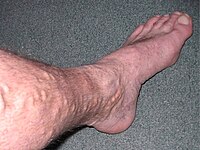
Photo from wikipedia
Residual venous obstruction (RVO) is considered a risk factor of recurrence and possibly other clinical outcomes following deep vein thrombosis (DVT). Current guidelines do not support an RVO-tailored duration of… Click to show full abstract
Residual venous obstruction (RVO) is considered a risk factor of recurrence and possibly other clinical outcomes following deep vein thrombosis (DVT). Current guidelines do not support an RVO-tailored duration of anticoagulant therapy; contemporary data of such management strategies are scarce. We aimed to evaluate an RVO-based management strategy and to assess associations of RVO with recurrence, post-thrombotic syndrome (PTS), arterial events and cancer. To gain further insight, D-dimer levels were measured one month after stopping anticoagulant therapy. Consecutive patients with symptomatic, proximal DVT were treated in a two-year clinical care pathway (CCP) at Maastricht University Medical Center and were followed up to 5 years. RVO was assessed at the end of regular duration of anticoagulant therapy, which was extended once if RVO was detected. The study was approved by the medical ethics committee. From a total of 825 patients, 804 patients (97.5%) completed the CCP and 755 (93.9%) were available for extended follow-up. Most patients (76.5%) stopped anticoagulant therapy. Incidence rates of recurrence, PTS, arterial events and cancer were 4.4, 11.9, 1.7 and 1.8 per 100 patient-years, respectively. RVO was independently associated with PTS (HR 1.66 [1.19-2.32]) and arterial events (HR 2.07 [1.18-3.65]), but not with recurrence or cancer. High D-dimer was associated with recurrence (HR 3.51 [2.24-5.48]). Our RVO-based management strategy might have attenuated the association of RVO with recurrence. In addition, RVO identified patients at increased risk of PTS and arterial events, which might be used to identify patients in need of alternative treatment strategies.
Journal Title: Thrombosis and Haemostasis
Year Published: 2022
Link to full text (if available)
Share on Social Media: Sign Up to like & get
recommendations!